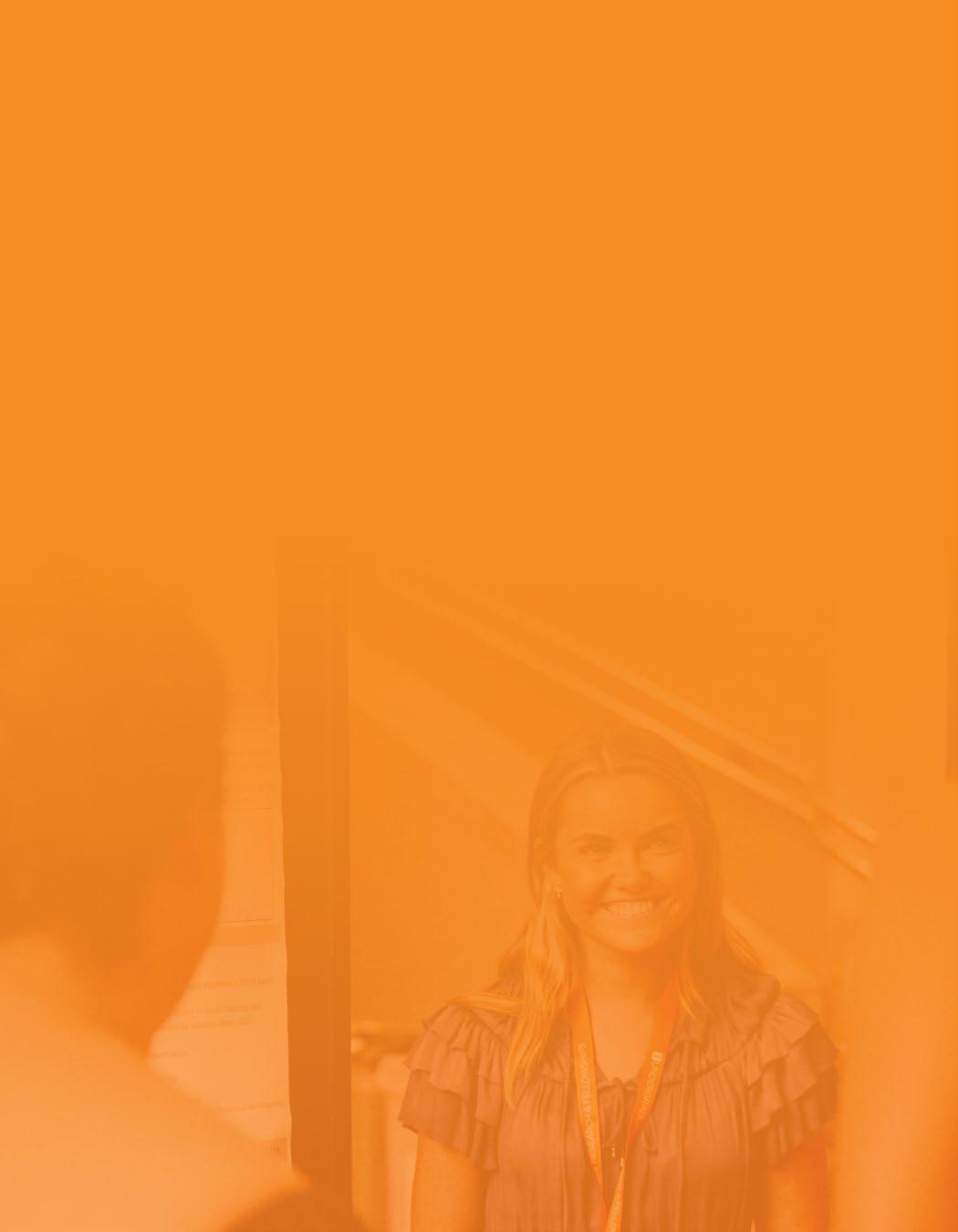
2024-2025 DIVISION OF STUDENT SUCCESS
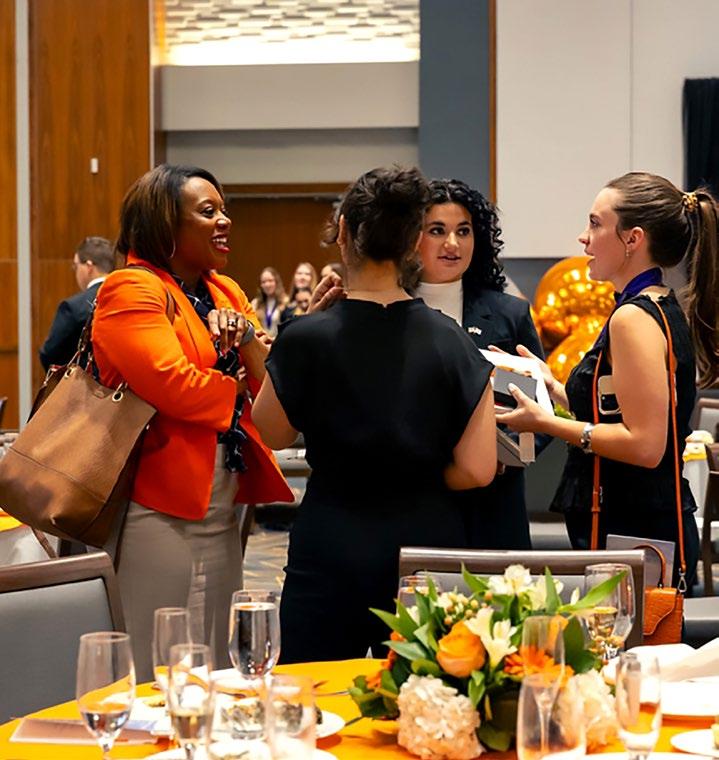


2024-2025 DIVISION OF STUDENT SUCCESS

We’ve reached a milestone.
Five years ago, University of Tennessee, Knoxville, Chancellor Donde Plowman recognized student success as a powerful catalyst to transform our flagship institution into a place where every scholar can thrive. Since I joined UT in 2020, the Division of Student Success has been powered by support and commitment at every level, resulting not only in significant upward trends in our key metrics but also in countless stories of scholars who reached or even exceeded the goals that once seemed daunting.
When we reflected upon our journey and the past academic year, one word seemed particularly appropriate, especially given our home here on Rocky Top: elevate.
Whether we’re referring to our student retention rate (now up six percentage points to 92.4%), or our four (67%) and six (74.5%) year graduation rates that have each climbed exponentially over the past five years, or the number of service interactions through the Vol Study Center (183,084), as well as the quality of our New Vol Experience orientation model (now with six sections to support scholars through their first full year), there’s no doubt we are rising to a higher place for our scholars and elevating their experience And so, that is the theme of this Impact Report.
Looking ahead, we will continue to rise— literally and figuratively—with the construction of our new, four-story Student Success Center, the physical symbol of the investment we are making in the potential of every scholar. It is scheduled to open in 2027.
We’ll launch new academic minors and curricula tailored for Gen Alpha in both of our University Honors programs—the Chancellor’s Honors Program and the Haslam Leadership Scholars.
We’ll launch the second phase of Vol Edge, our innovative career and life readiness program that cultivates highly skilled UT grads for the workforce. Our goal is for every scholar to cross the commencement stage possessing the confidence to articulate their valuable skills,
identify what they need from an employer to flourish, and know how to successfully secure a job, regardless of their major.
We’ll welcome more than 300 scholars to the first class of UT Promise on Rocky Top which will provide mentorship, service-learning, career planning, and more to those who receive the scholarship with the same name.
This past spring, Provost John Zomchick announced that the Division of Student Success will oversee the university’s Quality Enhancement Plan, part of our reaccreditation process that occurs every 10 years. Not only is this an honor but it is an incredible opportunity to further embed the three key components of our work—learning, well-being, and career readiness—into academics, positioning UT to revolutionize the student experience.
Thank you for walking alongside us these past five years. I hope you enjoy reading about all we’ve accomplished for our scholars, taking them and UT to new heights—together.
In the Volunteer spirit,
Amber Williams, Ed.D. Vice Provost for
Student Success
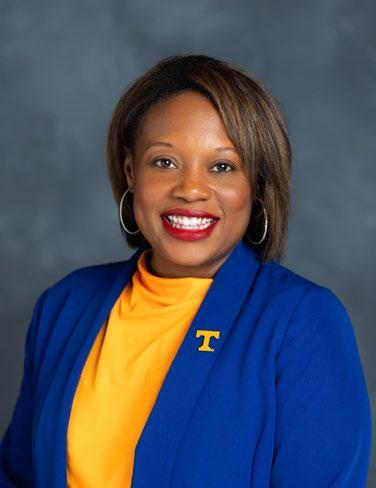
Executive Editor
Kara Addy, APR
Executive Producer
Richard Lee
Creative Director
Sadie Dennis
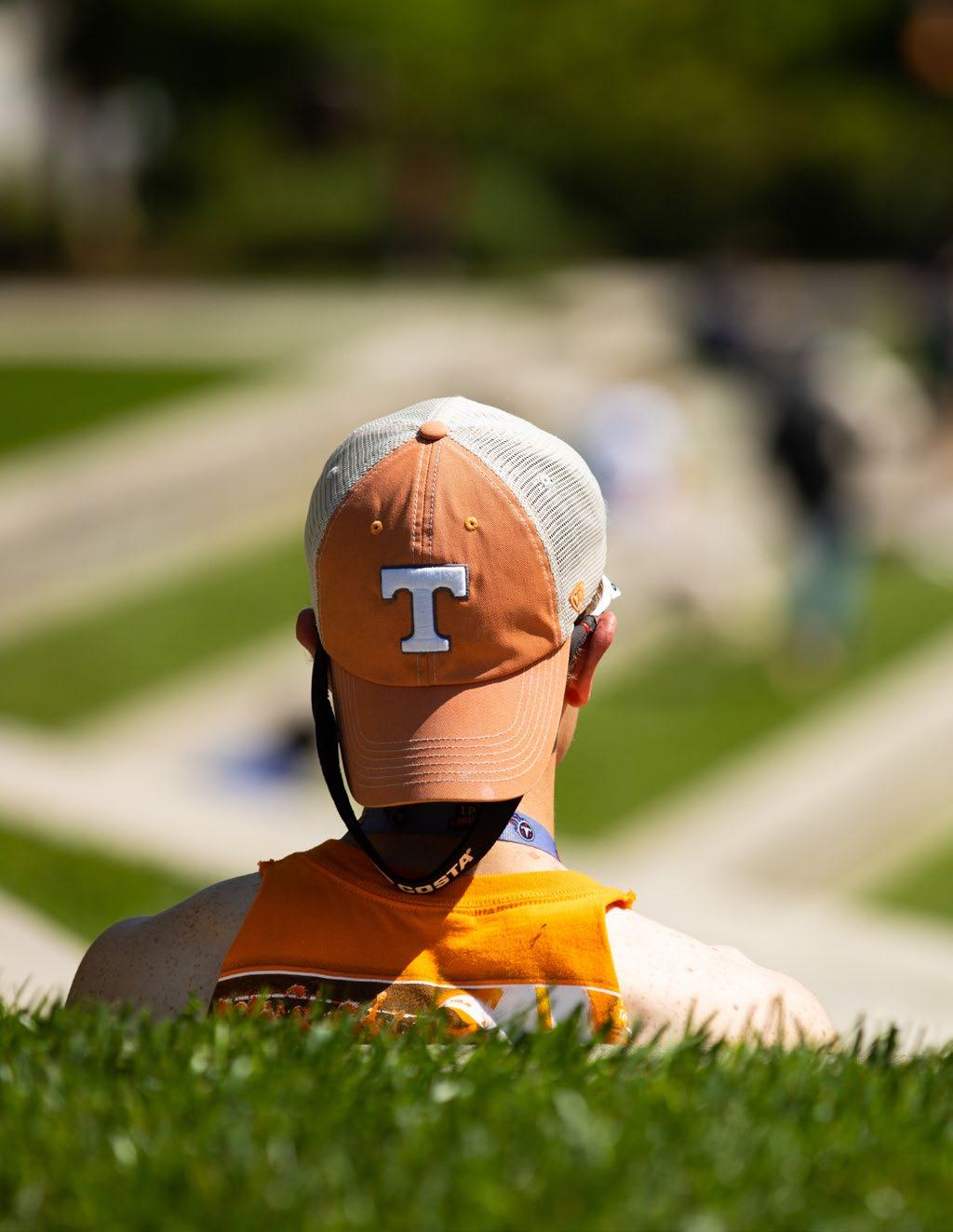
University Printing
Content Contributors
Madison Fuchs
Madisun Richardson Production and Printing
Continuing to Climb
• Five-Year Anniversary
• Breaking New Ground—Literally
• The Launch of Vol Edge
• Student Success US Conference
• New Vol Experience
• Churchill Scholarship Recipient
• Student Success Express
• Exploratory and Academic Advising
• Enhanced Support for Student Veterans
• Events & Celebrations
• 5-Year Goals
• Vol Edge Phases 2 & 3
• Quality Enhancement Plan
• University Honors
• UT Promise on Rocky Top
• Academic Success Center
• Center for Career Development & Academic Exploration
•
•
University Honors

S tudent success outcomes have been on the rise at UT, and recent numbers suggest they are still climbing.
In fall 2025, for the third straight year, UT posted a record retention rate with 92.4% of first-year students returning for their sophomore year. Additionally, a four-year graduation rate of 67%, along with a 74.5% six-year graduation rate set new records at UT.
Looking back, more than 90% of student scholars from the class of 2024 reported positive career outcomes after graduation.

92.4% FIRST-YEAR RETENTION RATE
more than 90% POSITIVE CAREER OUTCOMES
67% FOUR-YEAR GRADUATION RATE
74.5% SIX-YEAR GRADUATION RATE
At the end of 2019, a pivotal change occurred at the University of Tennessee, Knoxville, with the formation of the Division of Student Success (DSS). From the beginning, the goal for the division was clear and simple: to champion the success of every student.
To achieve this, the division grounded itself in three basic principes—build students’ confidence, set high expectations, and create the structures to support students.
The division marked its fifth year at UT with a celebration in January 2025. Chancellor Donde Plowman surprised the division at the event, and staff who served longer than five years were honored with a special plaque. A time capsule was prepared to open in 2030.
Let’s look back at some highlights over the past five years.

The Division of Student Success (DSS) is formed.
Provost Zomchick charges a 52-member Strengths Advisory Council to “build a strengthsbased campus,” and incorporate positive psychology into the undergraduate experience so they may thrive, resulting in adoption of the PERMA model.
UT hosts a campus-wide Vol Success Summit, a four-day professional development opportunity featuring nationally recognized speakers, interactive presentations, and roundtable discussions on contemporary student success topics. Keynote speakers include Dr. Tim Hodges, executive director of the CliftonStrengths Institute and senior consultant at GALLUP, and Clint! Runge, founder and CEO of youth-marketing firm, Archrival.
New Vol Orientation, the precursor to today’s New Vol Experience, launches with components to support scholars from the summer before their first year through their spring semester.
The first of its kind in the country, the Veteran Impact Program launches for firsttime, first-degree-seeking veteran scholars.
Dr. Amber Williams begins her tenure as UT’s first-ever Vice Provost for Student Success.
Dr. John Zomchick assumes the role of Provost and provides fiscal resources and consistent partnership to DSS.
Vol Success Teams launch, providing each incoming scholar with an academic advisor, an academic coach, and a financial aid counselor.
UT receives a highly selective Don Clifton Strengths for Students Award which “recognizes colleges, universities, and districts that enable students to learn what they naturally do best and apply their strengths to thrive in school and all areas of their lives,” solidifying the university as a strengths-based campus.
The first cohort of Volunteer Experience Faculty Fellows launches to infuse PERMA into their classrooms, department, and/or college. Eighteen faculty from across the campus participate in the first cohort.
The Student Success Grant Program launches with the first given to General Biology to support curriculum redesign.
In partnership with Inside Higher Ed, UT is selected to host the Student Success US 2024 conference, an international gathering of more than 200 universities.
Chancellor Plowman and Vice Provost Williams are invited to share UT’s innovative work around student well-being and belonging with Inside Higher Ed. They participate in IHE’s The Key podcast, and an op-ed.
For the second straight year, UT achieves a historic high retention rate at 92.4%.
For the fourth straight year, UT’s sixyear graduation rate climbs, hitting 74.5%, an all-time high. UT’s four-year graduation rate also improved to a record 67%.
More than 90% of the Class of 2024 reports positive career outcomes.

UT hosts the Thrive Summit, a half-day conference for faculty and staff to learn about the PERMA model for wellbeing and other student success strategies. Dr. Arthur Brooks, Parker Gilbert Montgomery Professor of the Practice of Public and Nonprofit Leadership at the Harvard Kennedy School; Professor of Management Practice at the Harvard Business School; and author of the 2022 #1 New York Times bestseller, From Strength to Strength: Finding Success, Happiness, and Deep Purpose in the Second Half of Life.
By the end of the academic year, Vol Success Teams increases use of Division of Student Success services from 3,277 coaching interactions in 2019 to 12,352.
The Division of Student Success launches Phase 1 of Vol Edge, a one-of-a-kind life and career readiness program. Phase 1 guides students through five interactive, asynchronous modules, co-created with a youth marketing firm to ensure engaging content. These modules cover key topics such as the skills employers are looking for; how to find experiential learning opportunities; networking; supporting your well-being through college and the job search process; and building your personal brand.
UT celebrates the groundbreaking for its new Student Success Center with UT leadership, students, alumni, donors, faculty, and staff.
UT is recognized as a top producer of Fulbright scholars for the seventh year in a row, with 10 students and recent alumni offered Fulbright U.S. Student Grants.
The Provost announces the QEP focused on learning, well-being, and career will be embedded into the Division of Student Success.
The Vol Study Center reports a record 183,084 service interactions, up from 19,759 in 2023. 2023
UT leaders recently broke ground on the new Student Success Building—a future hub designed to connect students with the resources they need to thrive academically and prepare for life after college.
Read More!
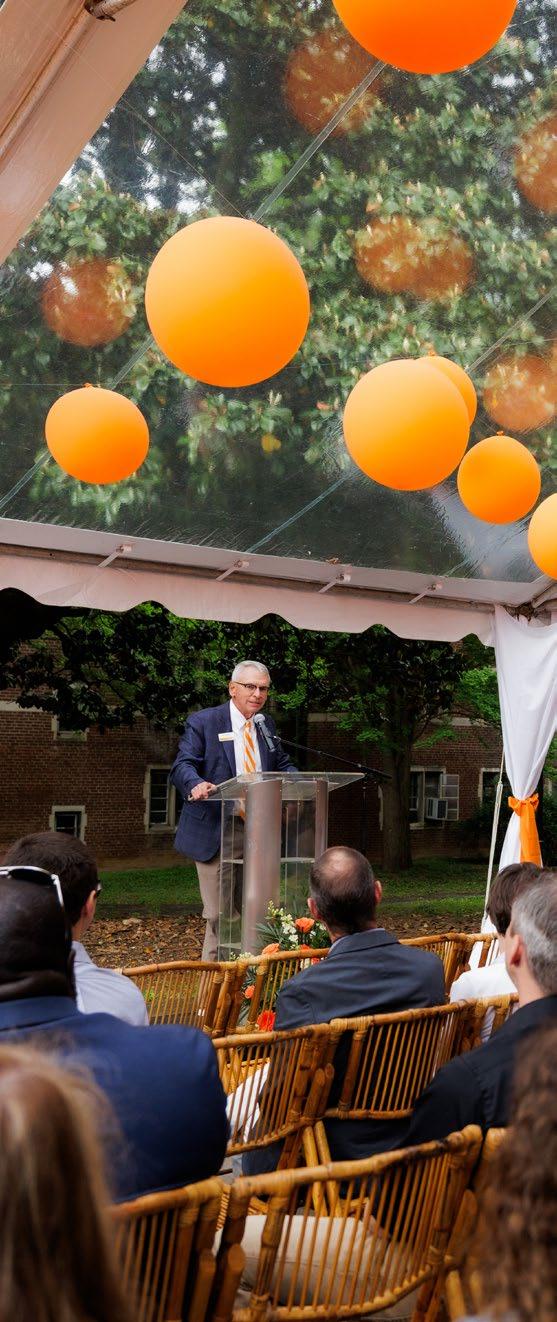
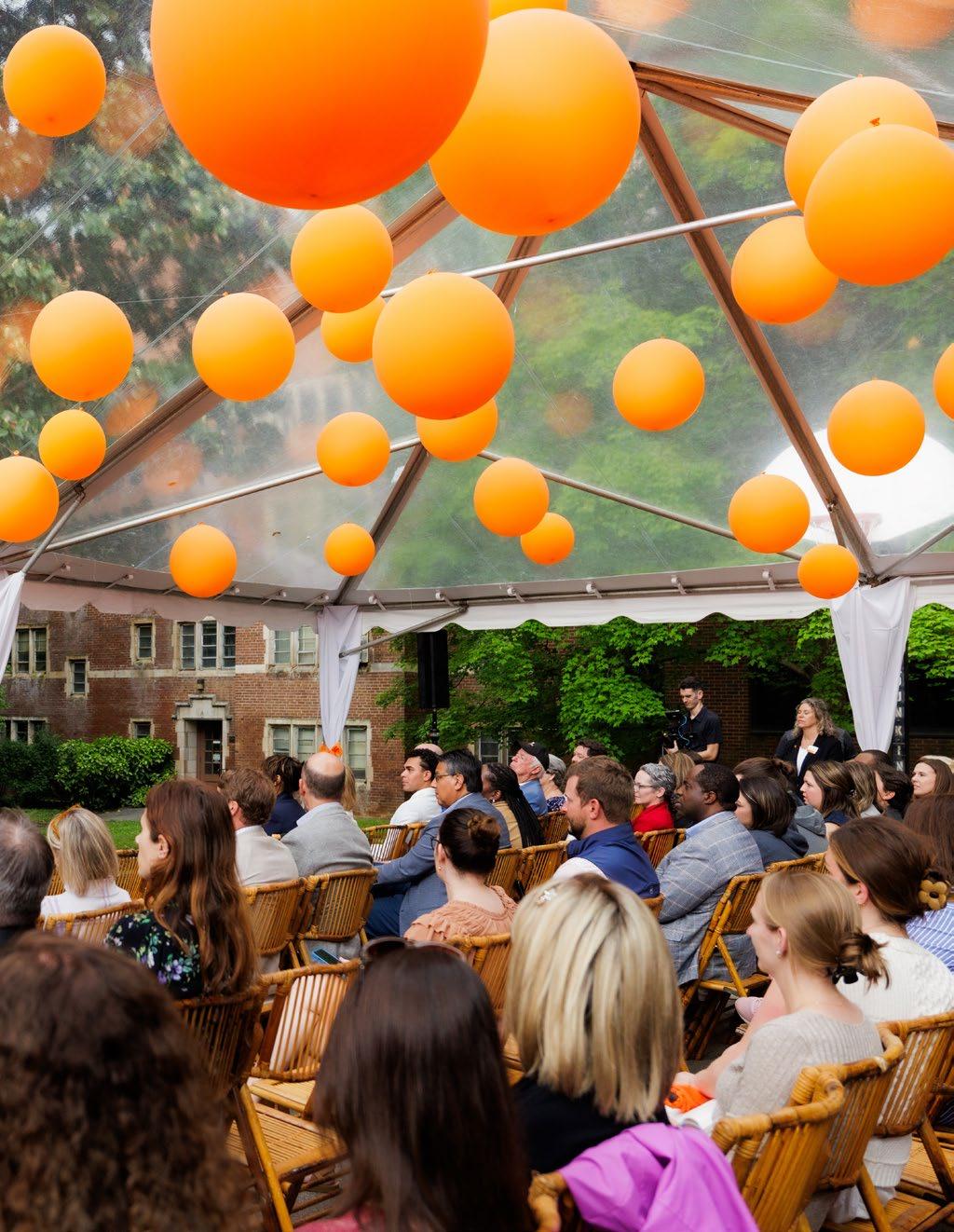
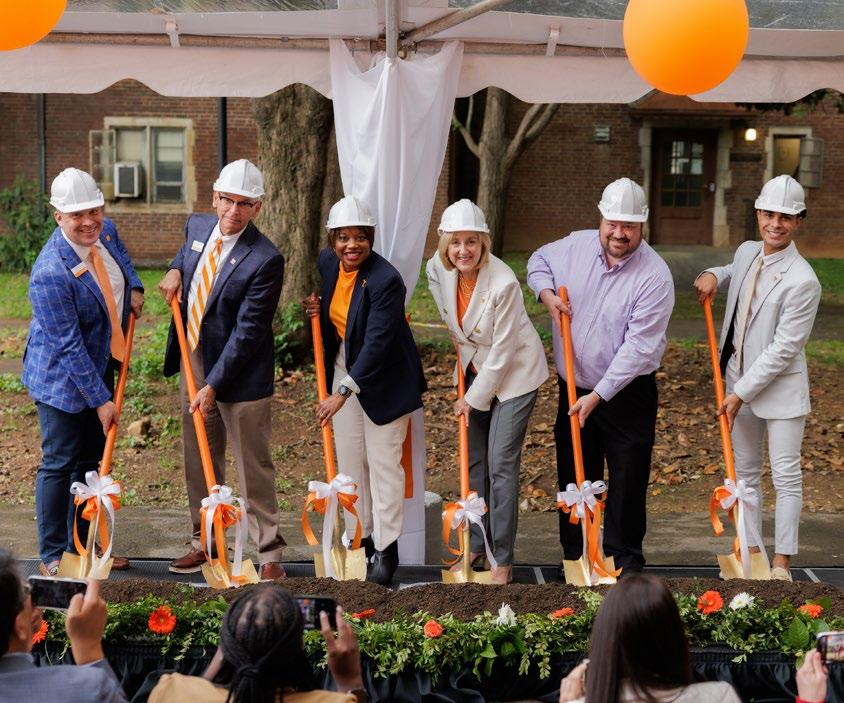
Wearing white hard hats and holding orange shovels, university leaders officially broke ground on the new Student Success Center on April 24, 2025.
The 119,000-square-foot, four-story building will replace Melrose Hall and sit in the heart of campus next to the John C. Hodges Library along the Johnson-Ward Pedestrian Walkway. It will serve as a central hub connecting students to resources that support their academic achievement, well-being, and career readiness.
The new facility will aid the Division of Student Success in its mission to retain a talented student body, connect students with resources to be successful in and out of the
classroom, and prepare students for the workforce by offering services in one centralized location. It will include multiuse classrooms, testing rooms, student lounges, a common space, and Division of Student Success offices. The free-standing building was meticulously designed with students in mind.
“While our new Student Success Building will be a beautiful addition to our campus, it’s what will be on the inside of the building that matters most,” said Vice Provost for Student Success Amber Williams. “It is the physical symbol of the investment we are making and the belief we have in the potential of every student – an investment that will propel UT to even greater academic heights.”
Williams was joined at the groundbreaking ceremony by Chancellor Donde Plowman, Senior Vice Chancellor for Finance and Administration Paul Byrnes, Provost and Senior Vice Chancellor John Zomchick and Student Government Association President Dante Grayson.
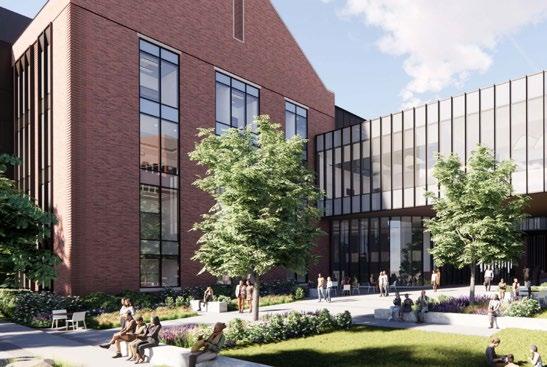
“
It is the physical symbol of the investment we are making and the belief we have in the potential of every student – an investment that will propel UT to even greater academic heights.
”
- Amber Williams
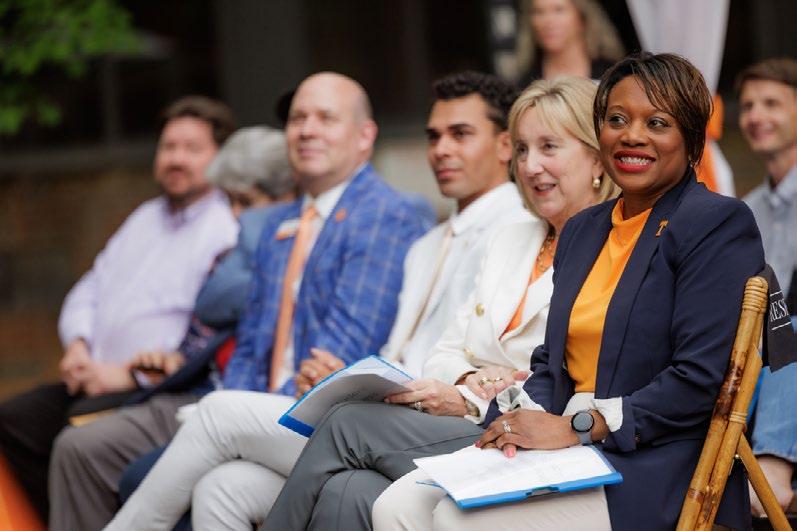
In January 2025, the Division of Student Success launched the first phase of Vol Edge, a career-readiness program that cultivates a thriving source of highly skilled graduates for the workforce.
Vol Edge equips scholars to graduate with confidence. Beginning in their sophomore year, scholars engage in structured learning, learn to craft their career story, and complete a transformative experience to prepare for future success. Additionally, they learn how to articulate and showcase their strengths to employers.
The Vol Edge Career Kickoff, held in January 2025, welcomed more than 400 students to an interactive event, where students explored resource stations and completed career readiness activities in the Humanities & Social Sciences Plaza.
When surveyed in spring 2025, 93% of scholars indicated the Vol Edge modules supported their career development goals.
The second phase of Vol Edge will launch in fall 2025. Focused on transformative experience, scholars will engage in internships, undergraduate research, education abroad, or service learning.
I found the Vol Edge modules incredibly helpful! Many of the topics covered were things I wish I had as a freshman to guide my next steps… My approach to preparing myself for a career has been to throw myself in as many directions as possible and see what sticks but this helped me slow down and reflect on the skills I have and how I can best market them to employers.
-UT Scholar
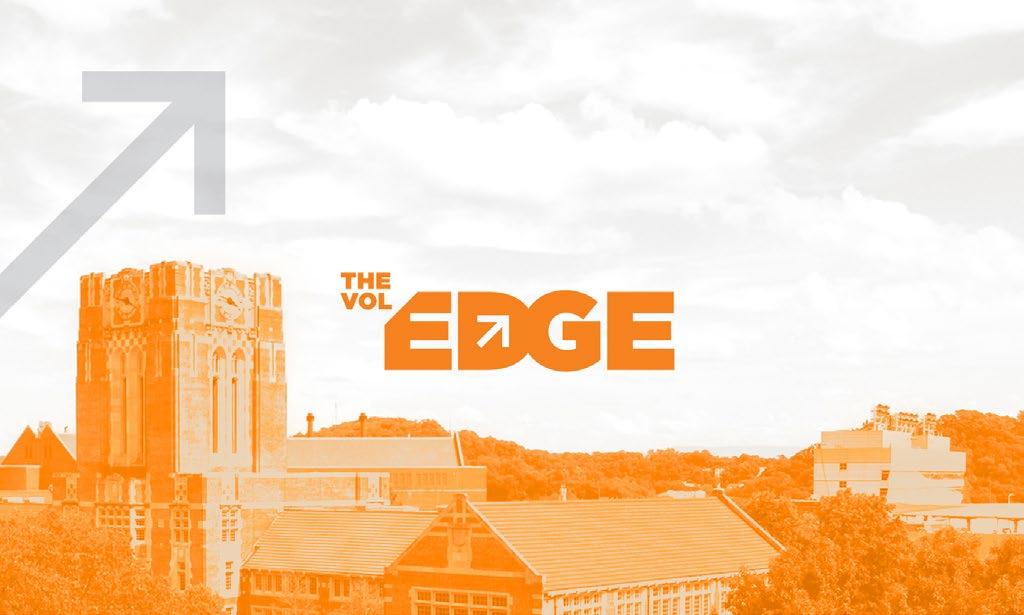
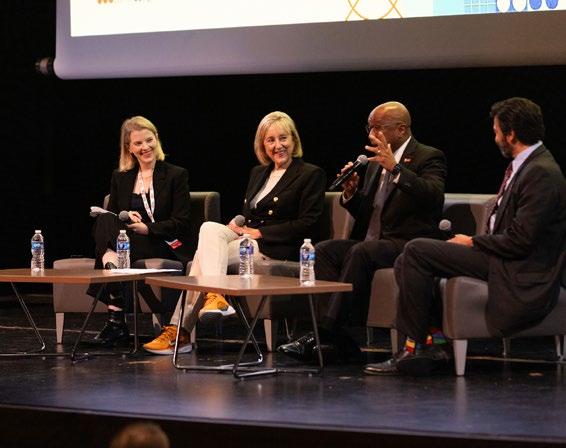
During the conference, UT thought leaders shared keys to success that have resulted in increased academic performance and retention across the university. For example, UT leadership—including Vice Provost Amber Williams, Vice Chancellor Frank Cuevas, and Associate Vice Provost Krystyne Savarese— shared the paths taken and the techniques employed to help the university develop methods to improve its students’ well-being.
In a panel featuring guest speakers Jonathan Koppell and Harry Williams, Chancellor Donde Plowman discussed leading with integrity and intention. Renowned author, professor and social scientist, Arthur Brooks, spoke with Provost John Zomchick and attendees about how to establish positive environments on campuses and improve their students’ well-being.
As a national leader in personalized approaches to student success, UT hosted the Student Success US 2024 conference in October. With the theme, “Leading with Integrity and Intention,” the conference brought together more than 500 attendees from 200 institutions worldwide to facilitate conversations about helping students succeed in college and beyond.
Organized by Inside Higher Ed and Times Higher Education, the conference offered more than 40 hours of panel discussions, workshops, and case studies exploring how to engage students, faculty, and staff in student success initiatives. Attendees also enjoyed extensive networking opportunities and a campus tour.
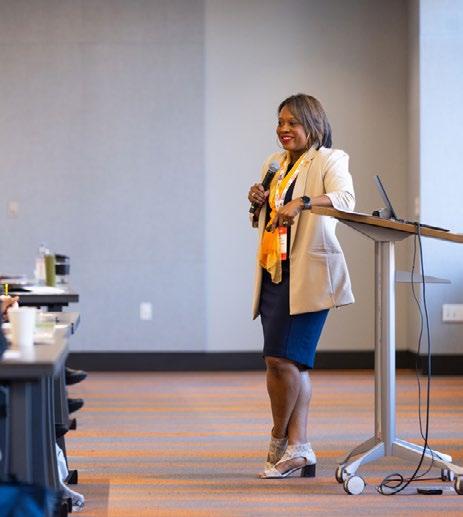
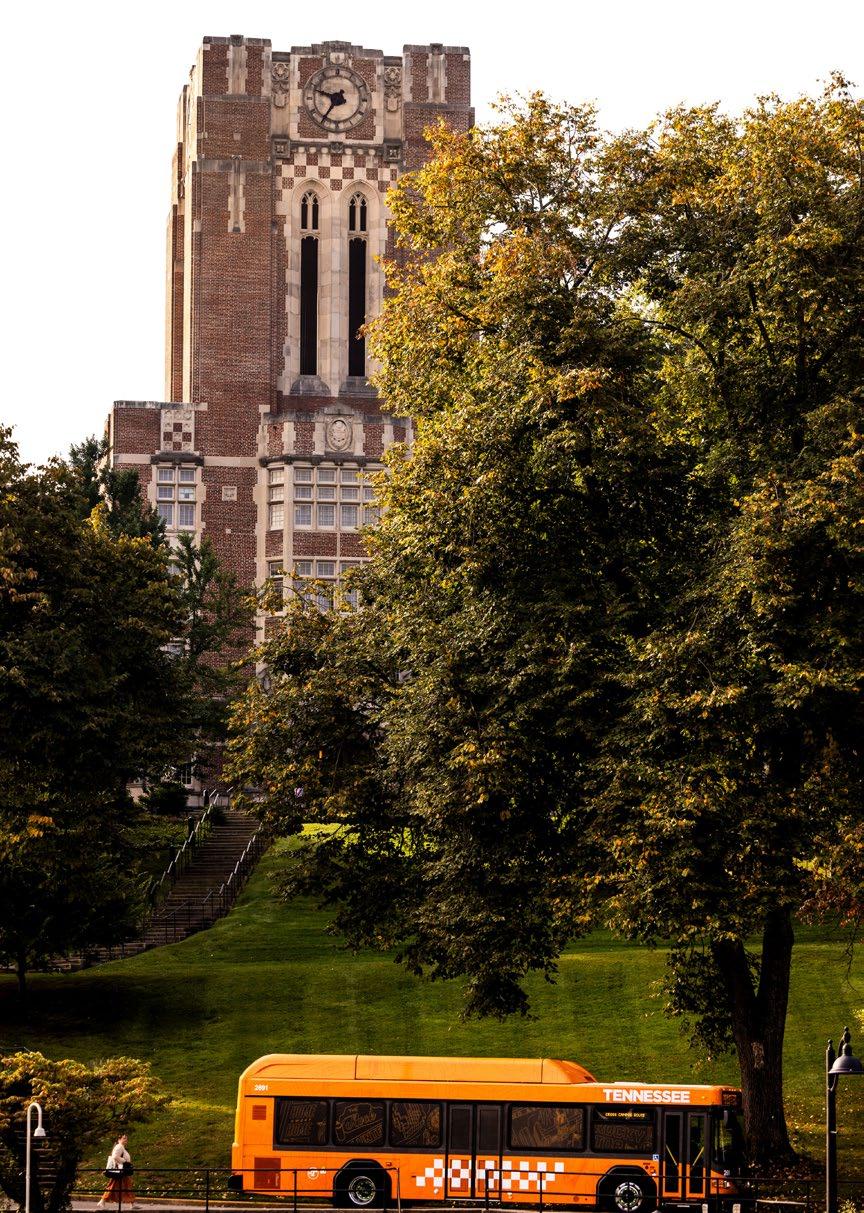
The Division of Student Success experienced several “firsts” during 2024-2025 that illustrated our continued momentum.
C ulminating several years of work, the full implementation of Vol 101-106— a major overhaul of the New Vol Experience—took place in fall 2024. The new orientation model now includes required and optional opportunities in a hybrid approach, positioned to increase participation and engagement. The New Vol Experience has multiple phases, each designed to support the onboarding and transition of new students throughout their entire first year, including:
Vol 105 – First-Year Seminar Vol 106 – Vols Start Back
For the first time in the history of UT, a scholar received the prestigious Churchill Scholarship.
Spring 2025 graduate Tyler Myers received the award funding one year of master’s study at the University of Cambridge. The scholarship is awarded to 18 students annually, positioning recipients at the forefront of scientific and technological research. Part of the Haslam Leadership Scholars, Myers studied biological sciences with a microbiology concentration and neuroscience with a minor in public health.
Established under the direction of Sir Winston Churchill in 1959, the Churchill Scholarship aims to strengthen the relationship between the United States and the United Kingdom by advancing science and technology. Vol 101 – Online Introduction to UT Vol 102 – New Student Advising Vol 103 – On-Campus Experience Vol 104 – Big Orange Welcome
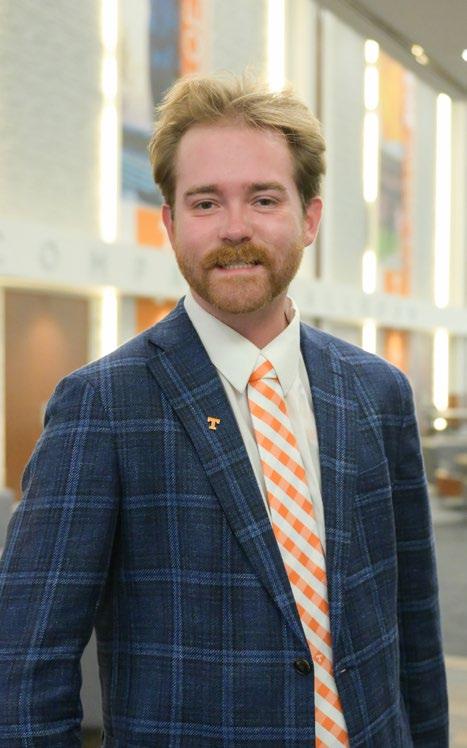
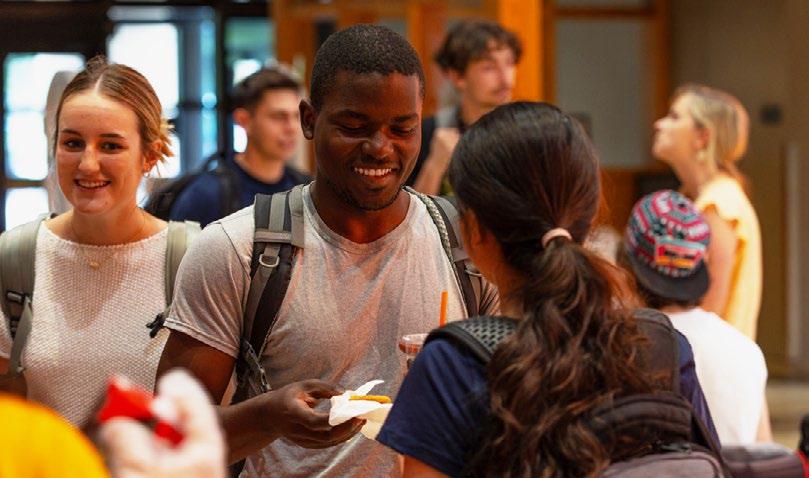
D esigned to provide students with a convenient after-hours option for support and resources, Student Success Express launched in fall 2024.
From academic advising to career services, students can now access a wide range of resources designed to guide them toward success well into the evening. Created to eliminate barriers, Student Success Express launched with representatives from Academic Advising, the Academic Success Center, the Center for Career Development, and the Office of Undergraduate Research and Fellowships. In spring 2025, support from OneStop was added.
Student Success Express takes place after 5 p.m. on the ground floor of Hodges Library.
In its inaugural year, Student Success Express supported scholars as follows: 50% 26% 24%



General Academic Support (including advising technologies)
Coaching Appointments (including Academic Coaching, Career Coaching, Undergraduate Research Coaching, Honors Coaching, and Veterans Coaching)
In 2024, University Exploratory, UT’s program for undecided majors, moved to the Center for Career Development and Academic Exploration. For the first time, exploratory and academic advising were offered to scholars through a single, assigned coach in a centralized setting through the Academic and Career Exploration (ACE) team.
More than 500 scholars were enrolled in 25 University Exploratory courses. In the first
cohort, the persistence rate (the percentage of first-time, first-year students who continued at UT) from fall 2024 to spring 2025 was 90%.
The ACE team adopted a student-centered approach to advising these scholars, resulting in an increase in how many students selected a major, were retained past their first year, and were in good academic standing.
For the first time, UT veteran scholars were served by two distinct offices: the Veterans Success Center (VSC) and the Veterans Benefits Administration (VBA).
Previously, services had been combined under one department. The new approach supports a rapidly growing student-veteran population at the university.
The VSC works collaboratively with campus partners to bridge the transition and gaps from military service to higher education to job obtainment, ensuring student-veterans succeed in and out of the classroom.
The VBA manages and oversees all aspects of benefit management to ensure compliance, coordination between campus and external partners, and all documentation and record keeping.
To promote the expansion of veteran-related services, the Grubb Family gifted a generous donation to support veterans through scholarship, programming, and coaching and to bridge a relationship with Tickle College of Engineering
Additionally, for the first time, a Veteran End of Semester Celebration honored graduating veteran-scholars at the Wolf-Kaplan Center in early May.

From the launch party for Vol Edge to our fifth anniversary celebration, the Division of Student Success never missed an opportunity to bring scholars, staff, faculty, and campus guests together. Knowing that connections are essential to well-being, the division hosted an array of inaugural events during 2024-2025.
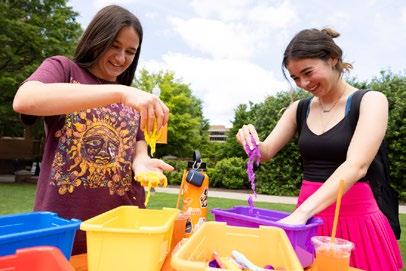


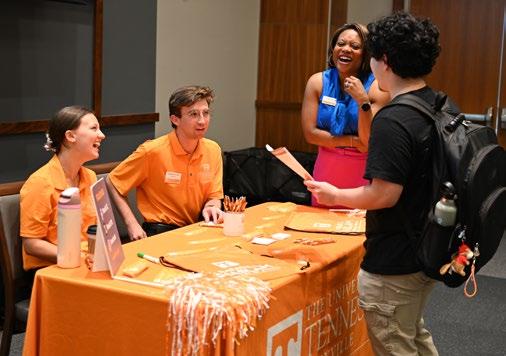
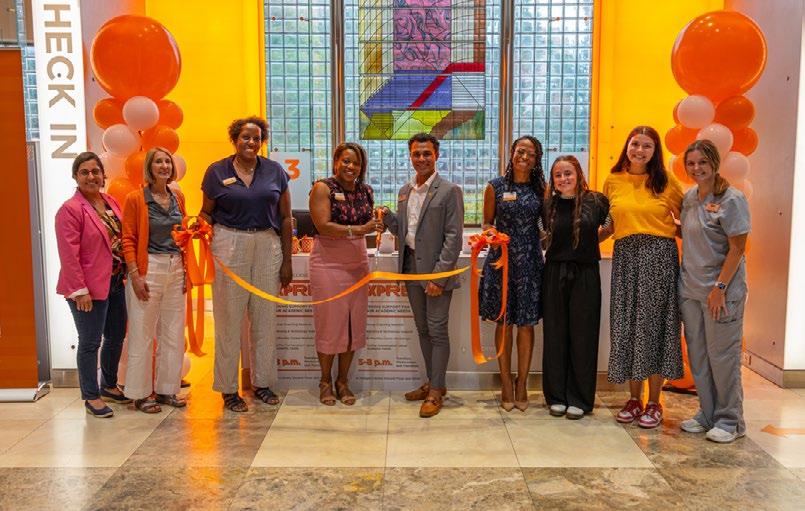
For example, Student Success Express-O launched to kick off each semester with a pop-up coffee station, coaching, and resources. Held in Hodges Library for the first time in September 2024, the new event is part of the Student Success Express initiative. In another firsttime event, Vice Provost Williams extended an open invitation for students to chat with her once a month as another extension of Student Success Express.

Halfway to Grad: A Sophomore Celebration highlighted the division’s effort to maximize all phases of the student experience by celebrating students completing their second year in May. The activities centered on developing goals for the final year(s) of college.
The Distinguished Tennessean Scholar Reception welcomed the first-year cohort to campus and celebrated their achievements in August 2024.
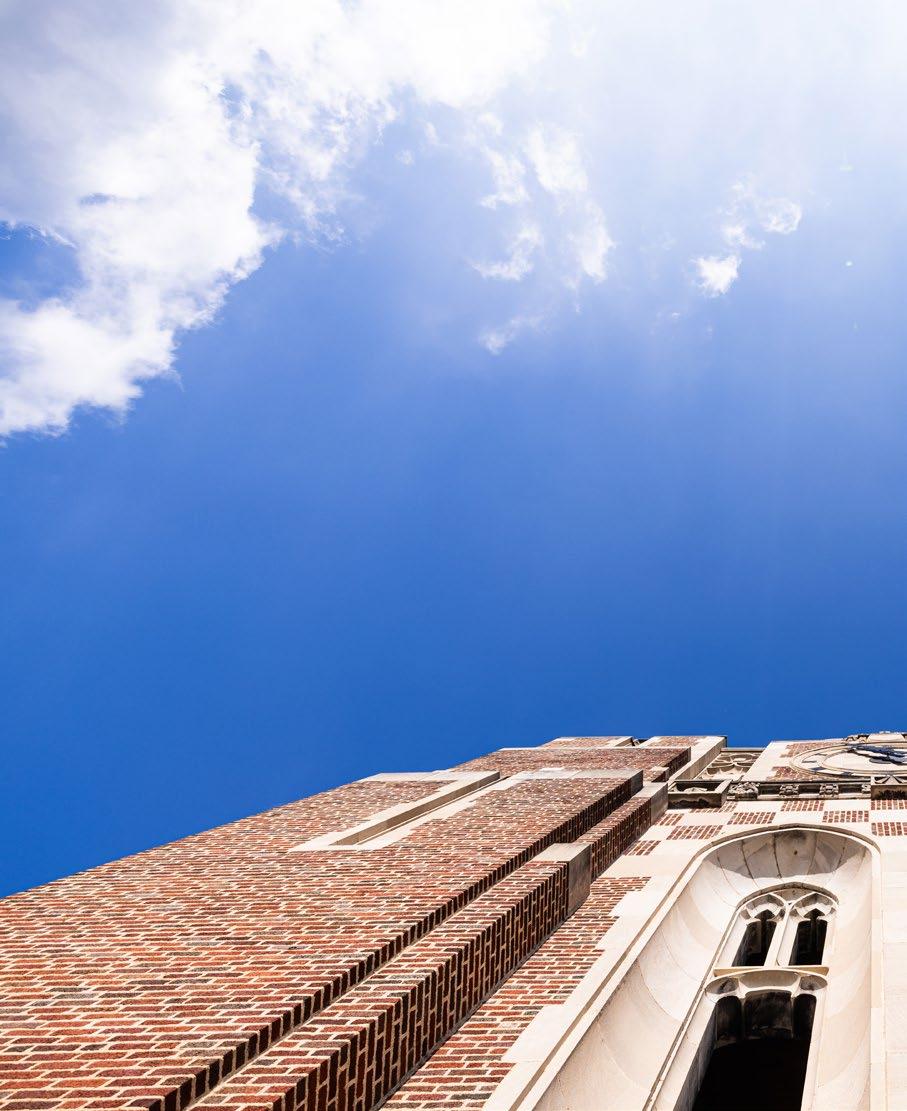
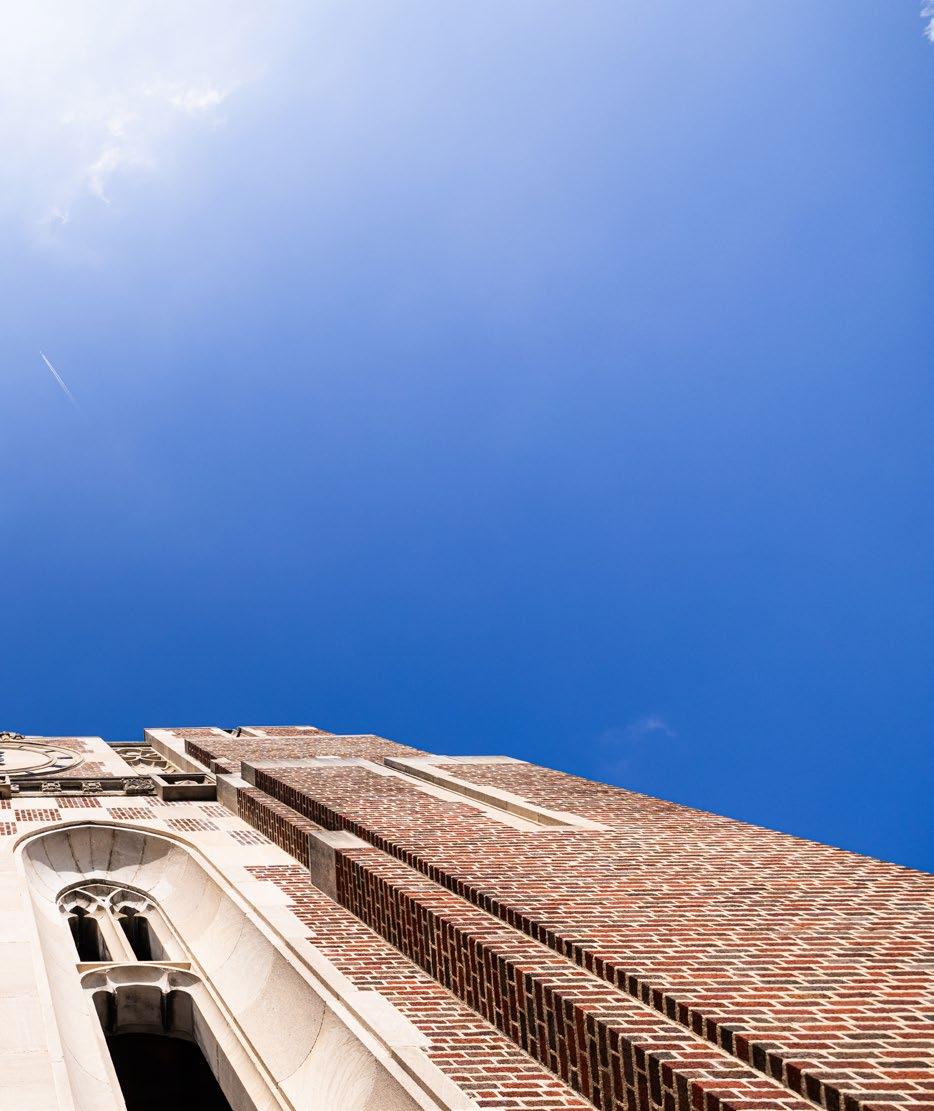
In collaboration with UT faculty and staff to help each scholar maximize their individual strengths, the Division of Student Success will achieve the following goals by 2030:
Achieve and maintain at least a 92.5% retention rate for first-year students.
Achieve a four-year graduation rate of at least 70%
Increase the six-year graduation rate to at least 80%.
Enhance UT scholars’ confidence, academic self-efficacy, and wellbeing by engaging 50% of scholars in high-impact practices.
Enhance new graduates’ self-efficacy regarding their post-graduation career plans by engaging 100% of scholars in Vol Edge or other intentional career development.
T he second and third phases of Vol Edge, the division’s innovative and unique life and career prep initiative, will launch during the 20252026 academic year.
Phase 2 will expand student access to comprehensive support and focus on hands-on applications and practical experiences that build upon the foundational knowledge. The Experiential Learning Support phase will guide scholars to complete one of four high-impact practices: research, an internship, service-learning, or an international
experience. Workshops will help scholars engage with intent and articulate the value of their experience.
Vol Edge Phase 3: Coaching for Telling Your Story will launch in fall 2026. In the third phase, scholars will practice telling their story in a context relevant to their career goals and receive meaningful feedback from someone in their area of interest. The experience could include a mock interview or creation of a graduate school statement of purpose.
As part of its reaffirmation of accreditation, the University of Tennessee, Knoxville, is embarking on a new Quality Enhancement Plan (QEP) focused on learning, well-being, and career that will be embedded in the Division of Student Success.
In fall 2025, academic leadership will lay the groundwork for a transformative approach to student success at UT. Focusing on QEP goals designed to eliminate “hidden curriculum” and unstated expectations for students, this work will help level the playing field for all students. The initiative will be further bolstered by efforts to enhance student well-being through the PERMA model and significantly improve career readiness. The collaborative effort will directly impact student retention, academic achievement, and overall preparedness for scholars to achieve successful careers and lives.
By 2026, the Quality Enhancement Plan: Foundations for Learning, Well-Being, and Career will be fully operational and poised to revolutionize the student experience. Its leadership team will include a full professor as executive director, two additional faculty directors, and a dedicated assessment director, ensuring strategic oversight and data-driven improvements.
Faculty will have access to ready-made tools to demystify college expectations for scholars and receive student success grants to incentivize pedagogical enhancements focused on well-being.
Additionally, the division will partner with departments to seamlessly integrate Vol Edge, its life and career readiness program, into their curricula through a system of incentives and pilot an on-campus internship program to provide invaluable experiential learning opportunities.
This comprehensive approach will embed student well-being and career preparedness into the very fabric of UT’s academic community, empowering scholars for success long after graduation.
B eginning fall 2025, two academic minors and curricula tailored for Gen Alpha will launch for both of our University Honors programs, further enriching their scholarly journey. Additionally, five full-time, dedicated honors faculty members will be on board by 2026.
As the division looks to expand both honors programs to keep pace with UT’s growth, the curricular and faculty enhancements will herald the next era for University Honors.
Both the Chancellor’s Honors Program (CHP) and the Haslam Leadership Scholars (HALS)
will now complete an academic minor. The CHP minor will center on complex problem-solving, emphasizing a collaborative and methodical approach to learning and ideation to tackle contemporary global challenges. HALS members will focus on core leadership coursework, an education abroad experience, a Tennessee-based internship, and a capstone project within the minor.
This academic expansion reflects the university’s commitment to attracting, cultivating, and retaining top talent, and preparing them to be impactful leaders and critical thinkers.


A new initiative, UT Promise on Rocky Top will welcome its first class of over 300 scholars in fall 2025. In partnership with the UT System, a UT Promise Scholars Reception provided resources to incoming scholars at an inaugural welcome reception in August 2024.
Students who receive the UT Promise scholarship will receive robust mentorship, service-learning, career planning and other support through the Division of Student Success. Primarily first-generation college students, the cohort members will receive scholarship support to cover tuition and fees for Tennessee residents after other aid is applied, making education more accessible.
Beyond financial support, students will receive an elevated journey through specialized orientations and career planning, personalized support from dedicated coaches, and powerful networks including alumni mentors in the scholar’s desired career path.



The Academic Success Center (ASC) commits to student excellence through academic coaching, topical workshops, and specialized guidance for scholars on academic probation. The Vol Study Center, housed within the ASC, is the hub for supplemental instruction and peer-led learning assistance to accompany classroom material.
Provided 7,881 academic coaching appointments
Delivered 183,084 total service interactions through the Vol Study Center
Engaged 3,642 students through the Academic Success Center
Supported 736 students with record-breaking 50.27% recovery rate to good standing through the Academic Probation Program—the highest percentage since spring 2016.

2025-2026 FOCUS
Among other initiatives, the Academic Success Center will expand online Supplemental Instruction to support additional courses, specifically targeting upper class students, to support the university’s six-year graduation rate goal of 80%.
Students who used online Supplemental Instruction had GPAs of students found coaching sessions beneficial and would recommend or attend again. 97% 99%
15% HIGHER
20% HIGHER and those who used in-person Supplemental Instruction had GPAs nearly than non-users.
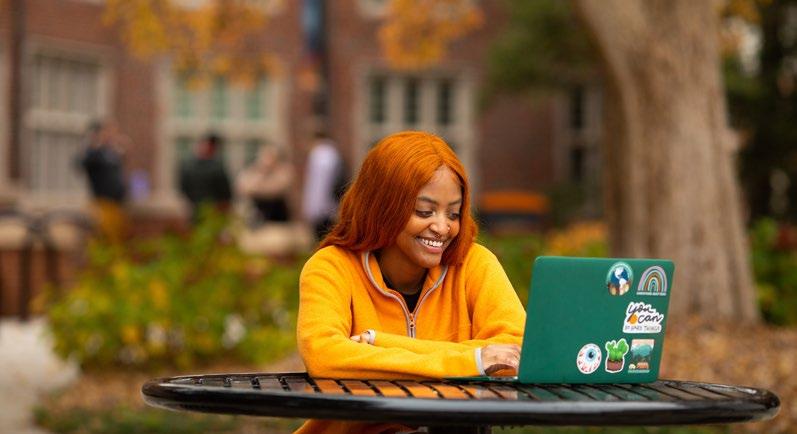
It's always helpful to have someone supportive to listen and brainstorm with... but this was helpful in a way that a friend, mentor, or therapist could never be. [My coach] knows so much about navigating UT, finding resources, and she knows so many amazing people.
- Academic Coaching Scholar

Data indicates students in good academic standing at the end of their first year are more likely to graduate.
The Center for Career Development & Academic Exploration houses three collaborative units— Academic and Career Exploration, Career Coaching and Education, and Employer Development—that align with the university’s strategic mission. Professional coaches, specializing in unique fields, partner with academic colleges to prepare students for career-building opportunities. Additionally, the center hosts several campus-wide job fairs, drawing talent seekers and ambitious students alike to UT, and promotes Vol Edge, a life and career prep initiative.
Launched Vol Edge with five dynamically designed modules available to all undergraduate students
Hosted 14 job fairs during the academic year
Experienced a year-over-year increase in student engagement with job fairs, from 7,602 to 8,689 a 14% increase over the previous year
Engaged 1,292 unique employers across 1,932 touchpoints, including job fairs, events, meetings, campus visits, and other strategic interactions
Conducted 2,760 University Exploratory appointments, an increase of 1,399 or 199% over the previous year
The Center for Career Development & Academic Exploration will launch the second and third phases of Vol Edge, the innovative life and career preparation initiative.


90.4%
of graduates reported
with 61% of graduates gaining employment and 30% continuing their education.
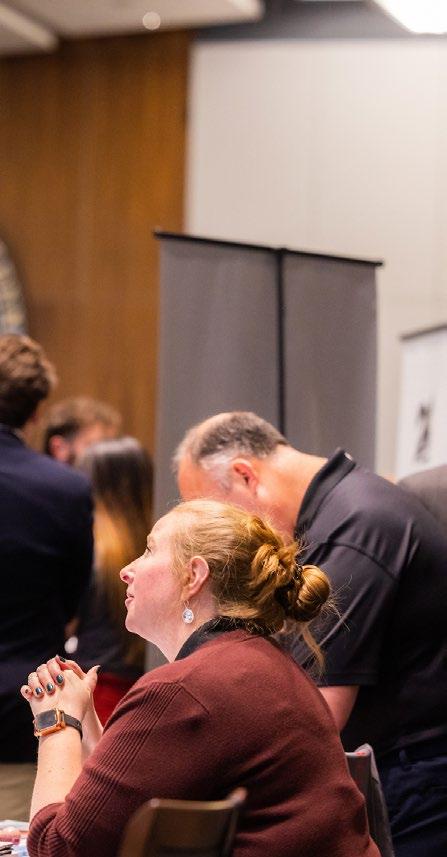
$62,000 was the median starting salary for 2023-2024 UTK graduates. of student survey respondents indicated Vol Edge modules supported their career development goals. unique organizations hired Volunteers.
93%

1,751
95% of employers who participated in the annual Employer Summit reported feeling more confident engaging in recruiting at UTK and ranked the event as “excellent” on a net promoter score assessment.
The Office of First-Year Experience acclimates all first year and transfer scholars to UTK. The New Vol Experience, UTK’s orientation programming, has six phases designed to support the onboarding and transition of new students throughout their entire first year. These include a CliftonStrengths assessment, first-year advising, and a university-wide collaborative event series in both the fall and spring semesters.
Oversaw the full implementation of the New Vol Experience orientation model, Vol 101-106
Overhauled New Vol Fest in which 4,000 students attended
Supported scholars who completed their firstyear seminar, resulting in a cumulative fall 2024 GPA of 3.5
The First-Year Experience team will add new Vol 101 sections for honors and veteran scholars. Additionally, the team will integrate well-being into the First Year Seminar Curriculum.

UT offers a lot of resources, but it is still overwhelming at times. The First-Year Studies class helped make sense of everything.
-
First-Year
Scholar “ ”

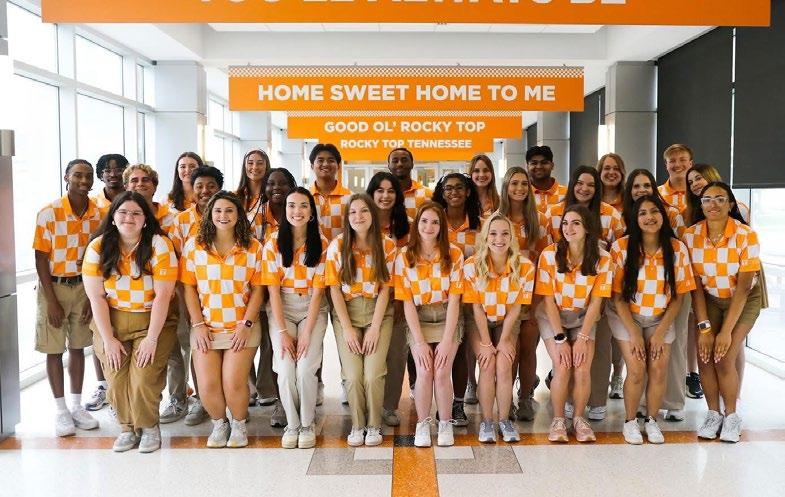
of students felt prepared for their first semester at UT.
of students agreed that Vol 101 made them more aware of the services available to them.
of students agreed that Vol 103 helped them learn about resources to succeed.

92% 99% 96% 94% 95% 100%
of students agreed that they met someone new in the first two weeks on campus.
of first-year students enrolled in a first-year seminar.

of participants felt academically prepared to succeed after attending Vol Start Back.


The division’s Strategic Initiatives team cultivates strong relationships with campus and external partners to further its mission. These partnerships promote a well-being focused and strengths-centered campus culture through initiatives such as the Volunteer Experience Faculty Fellows and Student Success Grants
Student Success Grants are awarded to departments to redesign courses. The twoyear grants focus on department priorities and involve collaborative efforts across the department and faculty teams. Progress is measured using the PERMA Profiler, a reliable and peer-reviewed scale centered on well-being.
Oversaw the second-ever cohort of Volunteer Experience Faculty Fellows, with 15 participants who learned about PERMA and CliftonStrengths The cohort presented PERMA well-being concepts to 15 departments and four national conferences.
After a Student Success Grant was awarded to Engineering, scholars’ PERMA scores increased from 6.49 in fall 2022 to 6.69 in fall 2024.
The fall 2025 cohort of Volunteer Experience Faculty Fellows will be the largest yet, with 21 participants from nine colleges and libraries.
Two new Student Success Grants will launch in 2025-2026, one with the calculus series in the math department and one with general chemistry.
“

Being
a Volunteer Experience Faculty Fellow has been one of my favorite experiences on campus over my 20+ years here.
- Volunteer Experience Faculty Fellow
”
The Office of Undergraduate Research & Fellowships elevates the pursuit of undergraduate research, nationally competitive fellowships, and creative activity through individualized coaching, topical workshops, and exhibitions.
Experienced the highest number of Benjamin A. Gilman International Scholarship applicants in a single cycle and the second-highest number of recipients at 25, just behind the record set in 2022
Nominated and received UT’s first-ever Churchill Scholarship recipient, a Haslam Leadership Scholar
Supported 45 students completing Fulbright US Student Grant applications, resulting in seven Fulbright Scholars and the university being named a Fulbright Top Producer for the seventh straight year
Celebrated three Goldwater Scholarship recipients
Hosted the Summer Research Scholars Symposium, Discovery Day, and the Exhibition of Undergraduate Research and Creative Achievement (EURēCA)
Undergraduate Research & Fellowships will provide tangible, online support for scholars with an online certificate connected to Vol Edge. The initiative will also support faculty in hiring entry-level research assistants.
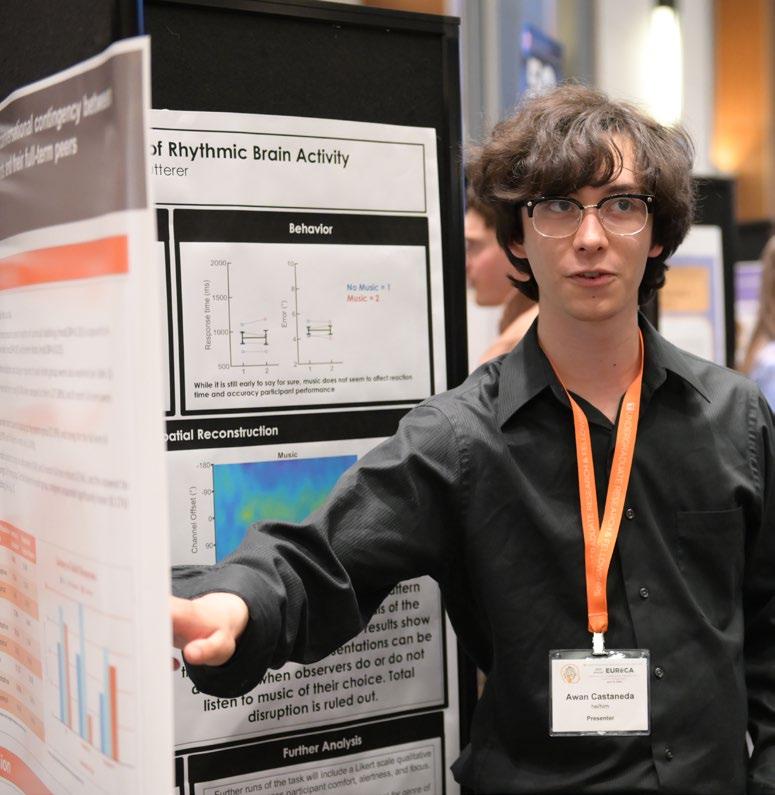

1,111
More than 225 applicants for over 18 unique fellowships were supported, resulting in scholars, supported by 382 faculty mentors, post-doctoral and graduate students, presented in three symposia to showcase undergraduate research and creative work across disciplines.
57 awards to UT scholars and alumni.

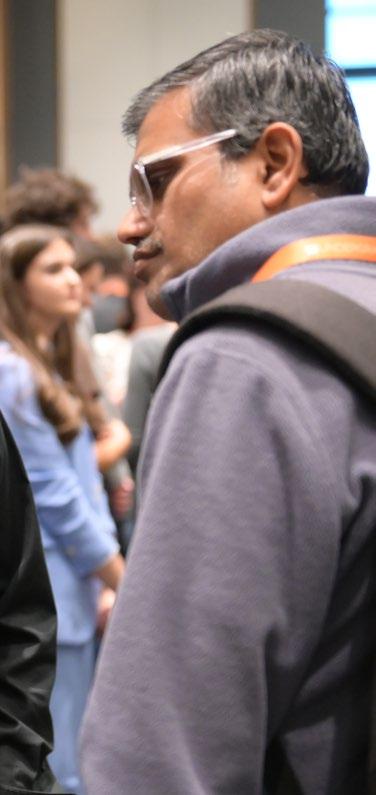
University Honors creates challenging yet rewarding experiences where scholars transform into confident leaders, global citizens, and powerful thinkers who can make an impact in their local community and beyond. University Honors is comprised of two interdisciplinary programs—Chancellor’s Honors Program and Haslam Leadership Scholars—that serve to enrich students throughout their college journey.
2024-2025 ACCOMPLISHMENTS
Experienced a year-over-year increase in average ACT and GPA scores for incoming honors scholars in both programs (see chart)
Introduced trained peer mentors into courses to enhance student engagement and support
Supported honors scholars through grants and immersion in studies, language, and culture to more than 20 study abroad destinations around the world, from Europe to South America to Asia and beyond
Recognized students admitted to the Chancellor’s Honors Program at a special Admit Day and provided resources geared for success at UT

2025-2026 FOCUS
Both University Honors programs will offer an academic minor. Chancellors Honors Program (CHP) scholars will focus on complex problem solving, emphasizing a collaborative and methodical approach to learning and ideation to tackle contemporary global challenges. Haslam Leadership Scholars (HALS) will complete core leadership coursework, an education abroad experience, a Tennessee-based internship, and a capstone project.
53.6%
Almost of students invited to participate in the Chancellor’s Honors Program applied—a 12.2% increase over the previous year.
24% MORE students than last year applied to the Haslam Leadership Scholars program.
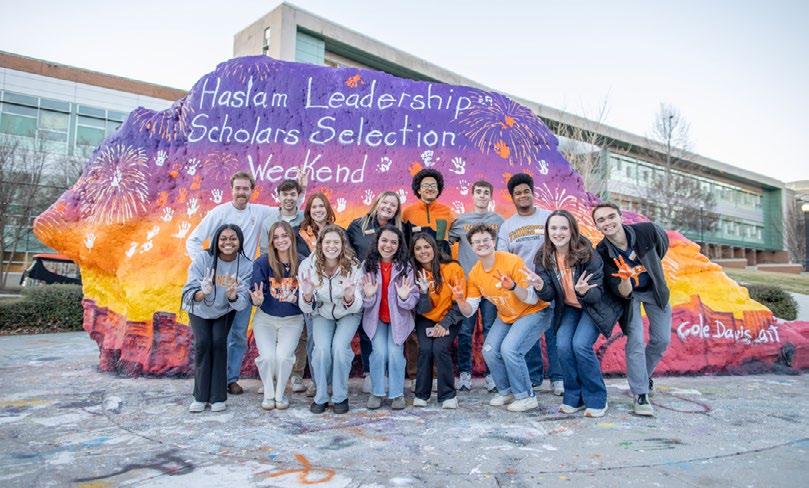





Tyler Myers of Haslam Leadership Scholars and Izzy Alexander of Chancellor’s Honors Program were named 2025 Torchbearers, the highest honor bestowed upon UT students. Additionally, Myers was one of 16 students in the world to receive the Churchill Scholarship (see related story), and he was named an Amgen Scholar for his research in gut brain microbiomes at Duke University.
Amelya Fox of HALS was also named an Amgen Scholar for her research in women’s and reproductive health at Harvard University, where she was accepted into a PhD program at its medical school. Fox also earned the highest GPA in the Tickle College of Engineering.
Timothy Held of HALS was named one of Poets & Quants’ “100 Best and Brightest Undergraduate Business Majors of 2025.”
Avery Noe of CHP was named a finalist for the prestigious Rhodes Scholarship for her research in musicology and historical research.
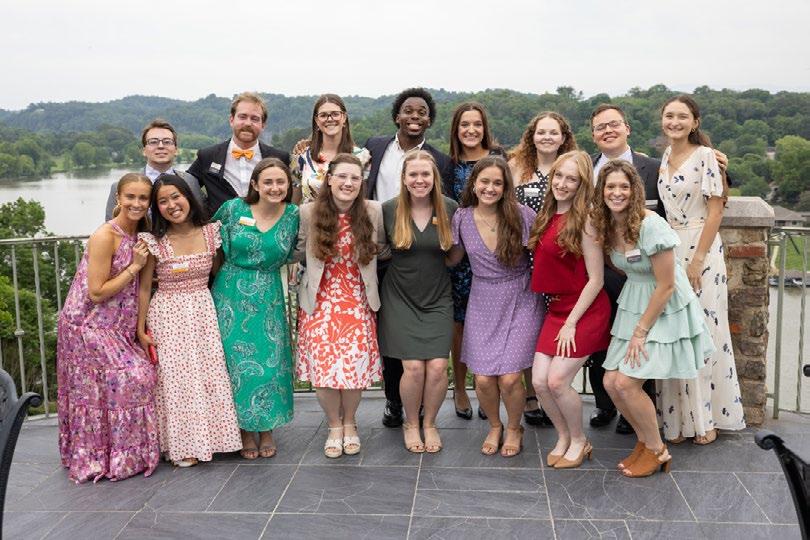
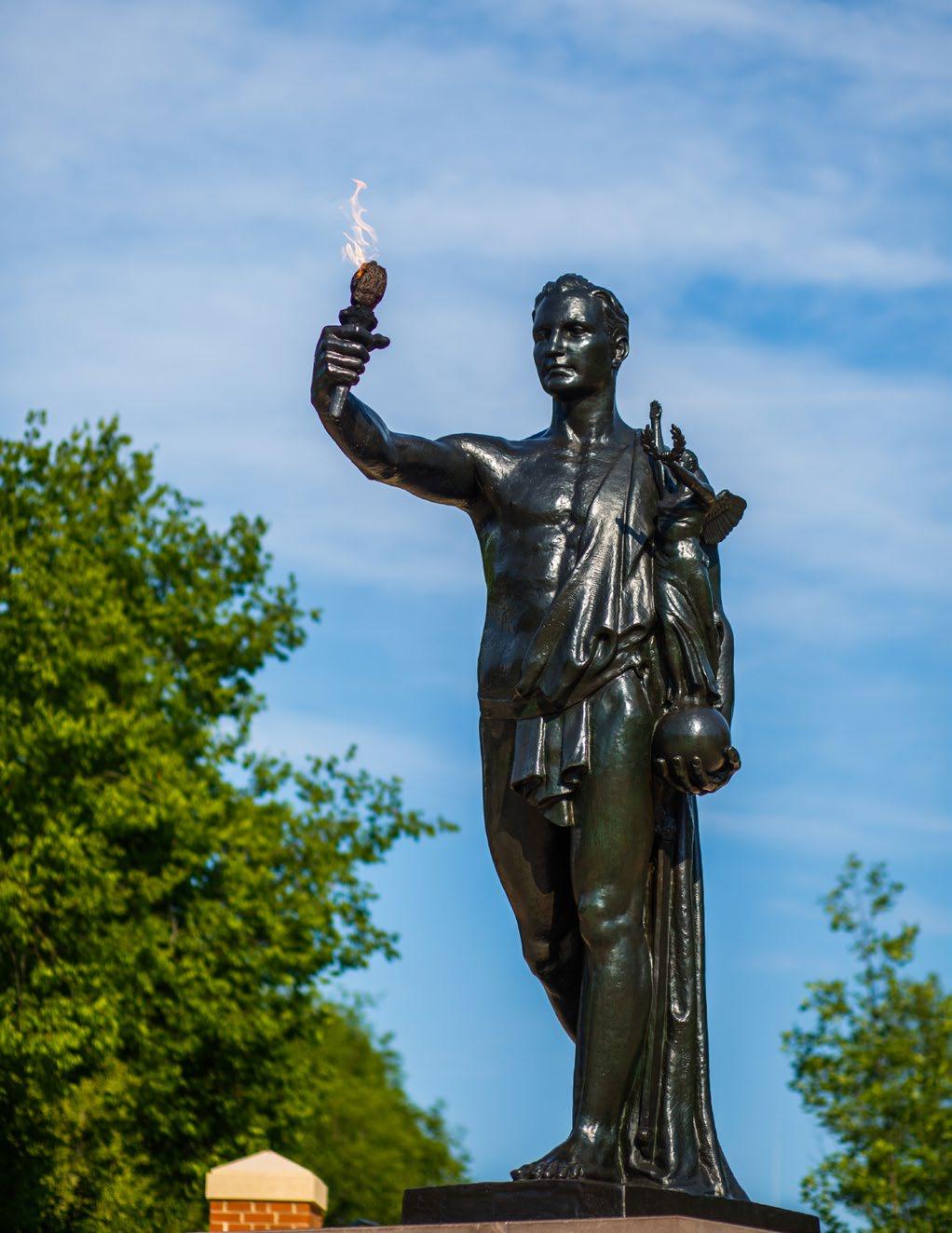
Veterans at UT is a collaborative unit with two distinct offices to support veteran scholars and military-connected students. The Veterans Success Center (VSC) serves to ease the transition from military service to higher education and job obtainment through specialized coaching and campus partnerships, well-being initiatives, and tailored workshops. The Veterans Benefits Administration office, previously enveloped within the VSC, navigates benefit management to ensure compliance with campus and external partners.
Hosted first-ever Veteran Graduation Celebration in Neyland Stadium for the Veteran Impact Program’s first cohort, presenting a special cord and medallion to each graduate
Earned a Silver Ranking as a Military Friendly School
Supported UT veteran scholar Kevin Ho, who was selected as the 2025 Military Friendly Tennessee Veteran of the Year and a finalist for 2025 Military Friendly Veteran of the Year.
The Veterans Success Center will partner with the federal and state Veterans Administration to host a Veteran Town Hall.
The Veteran Impact Program will expand into two semesters, focusing on academics in second.
The Veterans Benefit Administration will create a financial wellness and Veterans Administration benefits model to support incoming students.

I really enjoyed getting to know the campus and what is available. Also, the setting with other veterans was amazing.
- Veterans Impact Program Scholar “ ”
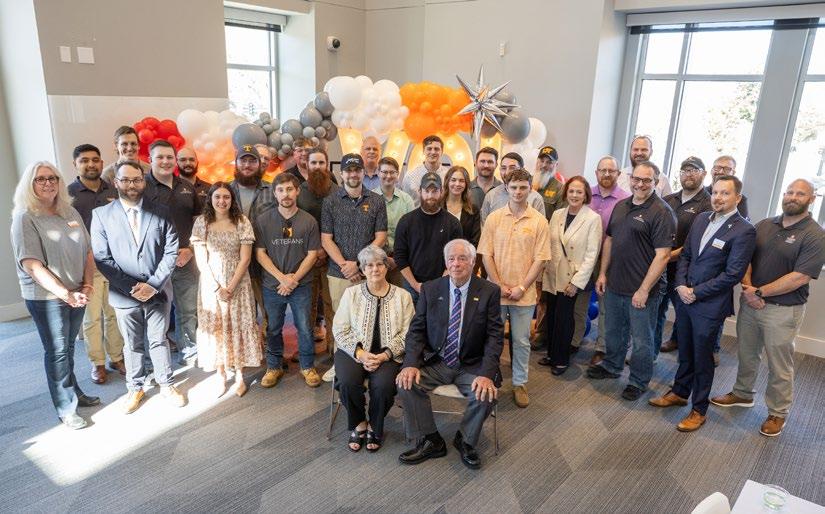

The average GPA for VIP members was higher compared to the UT general population during both fall 2024 and spring 2025 semesters. At the end of 2024, the average GPA for VIP members was 3.53.
In support of the Month of the Military Child, the Veterans Success Center increased engagement with scholars who are military dependents by 140% compared to the previous year.


The Division for Student Success works to engage each scholar’s experience by supporting their unique strengths and goals. In collaboration with UT faculty and staff, we help each undergraduate scholar maximize their strengths and understand how they contribute to their academic dreams, career paths, and personal well-being.
In collaboration with the campus community we:
Strategically oversee and support scholars in asking and answering the big questions of life:
• Who am I?
• Who do I want to be?
• How will I try to get there? Passionately advocate for scholars by identifying and eliminating barriers that impede enrollment, progression, and career readiness; Engage academically, proactively, and intentionally; Develop personalized strengths and talent-based programs to enhance the UT scholar experience by 1. 2. 3. 4.


